По всем вопросам обращайтесь на: info@litportal.ru
(©) 2003-2025.
✖
The Great Boer War
Настройки чтения
Размер шрифта
Высота строк
Поля
3. That their liberty and property be inviolate.
4. That an amnesty be granted – save in special cases.
5. That the Dutch language be allowed in schools and law-courts.
6. That rifles be allowed if registered.
7. That self-government be granted as soon as possible.
8. That no franchise be granted for natives until after self-government.
9. That no special land tax be levied.
10. That the people be helped to reoccupy the farms.
11. That 3,000,000 pounds be given to help the farmers.
12. That the rebels be disfranchised and their leaders tried, on condition that no death penalty be inflicted.
These terms were practically the same as those which had been refused by Botha in March 1901. Thirteen months of useless warfare had left the situation as it was.
It had been a war of surprises, but the surprises have unhappily been hitherto invariably unpleasant ones. Now at last the balance swung the other way, for in all the long paradoxical history of South African strife there is nothing more wonderful than the way in which these two sturdy and unemotional races clasped hands the instant that the fight was done. The fact is in itself a final answer to the ill-natured critics of the Continent. Men do not so easily grasp a hand which is reddened with the blood of women and children. From all parts as the commandos came in there was welcome news of the fraternisation between them and the soldiers; while the Boer leaders, as loyal to their new ties as they had been to their old ones, exerted themselves to promote good feeling among their people. A few weeks seemed to do more to lessen racial bitterness than some of us had hoped for in as many years. One can but pray that it will last.
The surrenders amounted in all to twenty thousand men, and showed that in all parts of the seat of war the enemy had more men in the field than we had imagined, a fact which may take the sting out of several of our later mishaps. About twelve thousand surrendered in the Transvaal, six thousand in the Orange River Colony, and about two thousand in the Cape Colony, showing that the movement in the rebel districts had always been more vexatious than formidable. A computation of the prisoners of war, the surrenders, the mercenaries, and the casualties, shows that the total forces to which we were opposed were certainly not fewer than seventy-five thousand well-armed mounted men, while they may have considerably exceeded that number. No wonder that the Boer leaders showed great confidence at the outset of the war.
That the heavy losses caused us by the war were borne without a murmur is surely evidence enough how deep was the conviction of the nation that the war was not only just but essential – that the possession of South Africa and the unity of the Empire were at stake. Could it be shown, or were it even remotely possible, that ministers had incurred so immense a responsibility and entailed such tremendous sacrifices upon their people without adequate cause, is it not certain that, the task once done, an explosion of rage from the deceived and the bereaved would have driven them for ever from public life? Among high and low, in England, in Scotland, in Ireland, in the great Colonies, how many high hopes had been crushed, how often the soldier son had gone forth and never returned, or come back maimed and stricken in the pride of his youth. Everywhere was the voice of pity and sorrow, but nowhere that of reproach. The deepest instincts of the nation told it that it must fight and win, or for ever abdicate its position in the world. Through dark days which brought out the virtues of our race as nothing has done in our generation, we struggled grimly on until the light had fully broken once again. And of all gifts that God has given to Britain there is none to compare with those days of sorrow, for it was in them that the nation was assured of its unity, and learned for all time that blood is stronger to bind than salt water is to part. The only difference in the point of view of the Briton from Britain and the Briton from the ends of the earth, was that the latter with the energy of youth was more whole-souled in the Imperial cause. Who has seen that Army and can forget it – its spirit, its picturesqueness – above all, what it stands for in the future history of the world? Cowboys from the vast plains of the North-West, gentlemen who ride hard with the Quorn or the Belvoir, gillies from the Sutherland deer-forests, bushmen from the back blocks of Australia, exquisites of the Raleigh Club or the Bachelor's, hard men from Ontario, dandy sportsmen from India and Ceylon, the horsemen of New Zealand, the wiry South African irregulars – these are the Reserves whose existence was chronicled in no Blue-book, and whose appearance came as a shock to the pedant soldiers of the Continent who had sneered so long at our little Army, since long years of peace have caused them to forget its exploits. On the plains of South Africa, in common danger and in common privation, the blood brotherhood of the Empire was sealed.
So much for the Empire. But what of South Africa? There in the end we must reap as we sow. If we are worthy of the trust, it will be left to us. If we are unworthy of it, it will be taken away. Kruger's downfall should teach us that it is not rifles but Justice which is the title-deed of a nation. The British flag under our best administrators will mean clean government, honest laws, liberty and equality to all men. So long as it continues to do so, we shall hold South Africa. When, out of fear or out or greed, we fall from that ideal, we may know that we are stricken with that disease which has killed every great empire before us.
notes
Примечания
1
Later information makes it certain that the cavalry did report the presence of the enemy to Lord Methuen.
2
More than once I have heard the farmers in the Free State acknowledge that the ruin which had come upon them was a just retribution for the excesses of Natal.
3
The destruction of the Creusot was not as complete as was hoped. It was taken back to Pretoria, three feet were sawn off the muzzle, and a new breech-block provided. The gun was then sent to Kimberley, and it was the heavy cannon which arrived late in the history of that siege and caused considerable consternation among the inhabitants.
4
The Gordons and the Sappers were there that morning to re-escort one of Lambton's 4.7 guns, which was to be mounted there. Ten seamen were with the gun, and lost three of their number in the defence.
5
Accurate figures will probably never be obtained, but a well-known Boer in Pretoria informed me that Pieters was the most expensive fight to them of the whole war.
6
An officer in high command in Ladysmith has told me, as an illustration of the nerve and discipline of the troops, that though false alarms in the Boer trenches were matters of continual occurrence from the beginning to the end of the siege, there was not one single occasion when the British outposts made a mistake
7
A battery which turned out its horses to graze found that the puzzled creatures simply galloped about the plain, and could only be reassembled by blowing the call which they associated with feeding, when they rushed back and waited in lines for their nosebags to be put on.
8
There was something piteous in the chagrin of these fine Sikhs at being held back from their natural work as soldiers. A deputation of them waited upon Lord Roberts at Bloemfontein to ask, with many salaams, whether 'his children were not to see one little fight before they returned.'
9
De Montmorency had established a remarkable influence over his rough followers. To the end of the war they could not speak of him without tears in their eyes. When I asked Sergeant Howe why his captain went almost alone up the hill, his answer was, 'Because the captain knew no fear.' Byrne, his soldier servant (an Omdurman V.C. like his master), galloped madly off next morning with a saddled horse to bring back his captain alive or dead, and had to be forcibly seized and restrained by our cavalry.
10
Of the other two one overturned and could not be righted, the other had the wheelers shot and could not be extricated from the tumult. It was officially stated that the guns of Q battery were halted a thousand yards off the donga, but my impression was, from examining the ground, that it was not more than six hundred.
11
It may be urged in General Colvile's defence that his division had already done a long march from Bloemfontein. A division, however, which contains two such brigades as Macdonald's and Smith-Dorrien's may safely be called upon for any exertions. The gunner officers in Colvile's division heard their comrades' guns in 'section – fire' and knew it to be the sign of a desperate situation.
12
This was a remarkable exhibition of the harmlessness of shell-fire against troops in open formation. I myself saw at least forty shells, all of which burst, fall among the ranks of the mounted infantry, who retired at a contemptuous walk. There were no casualties.
13
Sunday cricket so shocked Snyman that he threatened to fire upon it if it were continued.
14
Mr. Leary was wounded in the foot by a shell. The German artillerist entered the hut in which he lay. 'Here's a bit of your work!' said Leary good-humouredly. 'I wish it had been worse,' said the amiable German gunner.
15
Further information unfortunately shows that in the case of the sick and of the Colonial prisoners the treatment was by no means good
16
Fragments continually met the eye which must have afforded curious reading for the victors. 'I hope you have killed all those Boers by now,' was the beginning of one letter which I could not help observing.
17

















